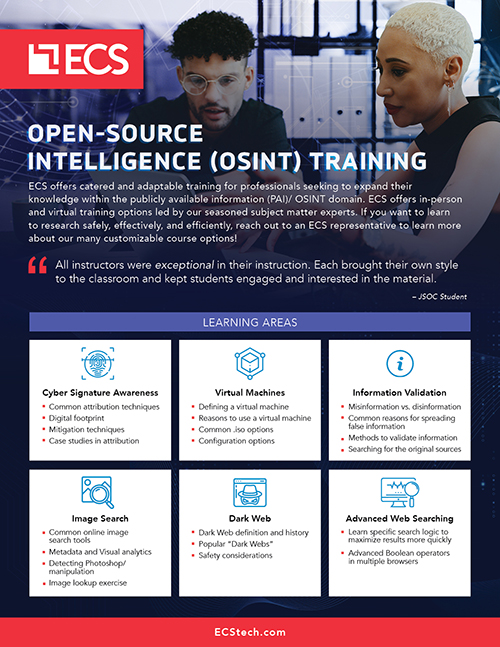In today’s information age, publicly available information (PAI) has become increasingly important to intelligence analysis, cybersecurity, criminal investigations, and more. In order to transform PAI into actionable open-source intelligence (OSINT), analysts and investigators rely on PAI solutions to help collect, digest, and analyze vast troves of public data.
Sherri Smith, program manager at ECS, sat down to discuss how she trains organizations in PAI research using ECS’ Argos platform—a powerful, low-cost, customizable tool to securely collect and analyze PAI.
SHERRI SMITH
Training Program Manager – Intelligence, OSINT, and PAI

Q: How does a PAI platform like ECS Argos help investigators conduct research?

SHERRI SMITH: Say you are a commercial company protecting high-value clients or an intelligence analyst conducting counterterrorism research in the Middle East. You can gather a lot of useful intelligence from public information. PAI includes everything from newspapers and scholarly articles to social media posts and more. With so much information available, investigators need to sift through large amounts of data securely and efficiently. PAI platforms help organizations aggregate and analyze this information, transforming it from a mess of data into actionable business and mission intelligence.

Q: What are major considerations to look for in a PAI platform?

SHERRI SMITH: Scalability, security, and customization. A lot of PAI platforms have limited scalability and can’t integrate with commercial-off-the-shelf solutions organizations already employ. Given the inflexibility of these platforms, organizations can end up paying for services they don’t need and tools they already own.
Security is also another important consideration, especially for the intelligence community. PAI researchers need the ability to mask their digital footprint while conducting sensitive investigations. Managed attribution enables users to manipulate their location and appear as if they are operating out of another region or country. Some managed attribution solutions can only mimic a limited number of locations. Organizations need to consider if the number and placement of these locations match the needs of their mission.
Q: How does ECS’ Argos PAI platform address these concerns?

SHERRI SMITH: Working closely with members of the intelligence and business communities, ECS developed Argos PAI—a pay-as-you-go artificial intelligence ecosystem designed to help organizations digest and investigate PAI. The platform enables users to instantaneously access a host of advanced PAI tools such as Maltego, Anaconda, Zignal, and more without having to invest in new hardware or software. The platform integrates with the devices and licenses a customer already owns, and with ECS Argos’ pay-as-you go model, customers only pay for the services they need when they need them. The platform’s managed attribution capabilities also allow users to mask their digital footprints and appear in over 150+ locations worldwide.
Q: How does training impact an organization’s ability to conduct PAI research?

SHERRI SMITH: Say you are a commercial company protecting high-value clients or an intelligence analyst conducting counterterrorism research in the Middle East. You can gather a lot of useful intelligence from public information. PAI includes everything from newspapers and scholarly articles to social media posts and more. With so much information available, investigators need to sift through large amounts of data securely and efficiently. PAI platforms help organizations aggregate and analyze this information, transforming it from a mess of data into actionable business and mission intelligence.






